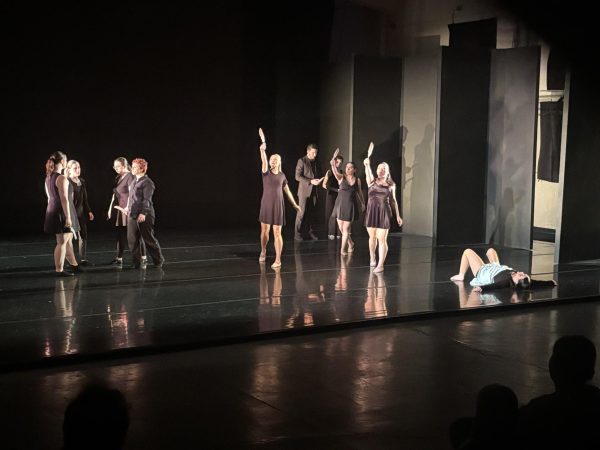Campus women’s groups chip away at ‘glass ceiling’
n 2019, women only held 28% of managerial positions in the workplace — the same number as in 1995 — according to the United Nations. Although drastic improvements have been made for the empowerment of women throughout the years, there is still no crack in the proverbial glass ceiling.
According to the United Nations Population Fund, the four changes that have defined the last 10 years of women’s rights movements have been the amplification of women’s voices, contraceptive choice, less-rigid gender roles and commitment to change. However, the UNPF finished the article stating that things have improved but “the greatest achievements lie ahead.” Empowering local communities creates a future of strong women who will continue to benefit the communities they are a part of for the rest of their lives.
As stated by Nancy A. Naples and Manisha Desai in their book “Women’s Activism and Globalization: Linking Local Struggles and Global Politics,” “women around the world are also helping to empower the next generation of women activists who will build on the valuable foundation laid by the foremothers.”
Multiple organizations on Allegheny College’s campus — Black Girl Magic, Why Not Us?, Women in Business and Economics and Women in STEM — seek to empower women on campus in meaningful ways.
Black Girl Magic’s goal is “to engage in the holistic development of Women of Color, Black Girl Magic will connect its ideals to support, grow, and bond together through four principle tenets: civic, academic, personal, and social,” according to BGM’s website.
Kabang “KB” Nyarsuk, ’24, a board member of BGM, emphasized how important BGM has been in creating a safe place for Black, Indigenous, and People of Color, specifically Black women, on campus.
“Empowerment means a lot of things,” Nyarsuk said. “It means coming together, supporting each other — whether through fun things (or) interrelations.”
Nyarsuk explained that BGM has created a network for BIPOC to have those social interactions as well as creating a safe space for people to share their stories and be supported.
Why Not Us is an organization on campus that provides sexual assault awareness and is working on cultivating a consent culture on campus. Although Why Not Us is an organization that does not work solely with women, one in five women on college campuses will be sexually assaulted, according to the Office on Women’s Health, making sexual assault awareness an important issue in the empowerment of women. Recently, a sexual assault occurred on the University of Nebraska Lincoln campus involving the Phi Gamma Delta fraternity. In solidarity with the victims of that incident, president and public relations chair of Why Not Us, Bree Gray, ’23, paired with Allegheny’s Pi chapter of Phi Gamma Delta. Why Not Us and Fiji spent three days spreading awareness about sexual assault, giving out information about local resources and signing consent pledge cards.
“The brothers of Phi Gamma Delta were extremely great to work with,” Gray said. “It’s really just the start of working collaboratively with other organizations on Allegheny’s campus.”
In the future, the organization is hoping to continue campus-wide collaboration and amplify voices to the campus community.
The amplification of voices is not a trait exclusive to the organization Why Not Us. The Women in Business and Economics Club as well as Women in STEM take a stand against the silencing of women in male dominated areas of academia. Approximately 55% of all undergraduate students are women but only make up approximately 35% of Business and Economics majors — a statistic cited in the club’s goal. This is a statistic that stood out to Maya Ginter-Frankovich, ’22, co-founder and current president of the club.
“A few other students and I created this club in the hopes that this would start to even out the gender disparity within both the business and economics departments as well as give women more confidence to move through the school and into their careers,” Ginter-Frankovich said. “A lot of (women) feel inferior because of societal pressures saying that they can’t do it and so I hope to build more of a support network for them.”
The inspiration came from a visit Ginter-Frankovich took to the Women in Economics Symposium which is a yearly event that is hosted to inspire women around the country to investigate careers in economics. The Women in Economics Symposium is an event at which female economists and professors from all over the country make an appearance and speak in panels about the future of women in economics, according to the St. Louis Federal Reserve Bank.
Another abrupt statistic shows that only 28% of women make up the workforce in STEM fields, according to the American Association of University Women. The AAUW also stated that women are also discouraged, through male-dominated systematic education, away from studying STEM fields. The Women in STEM club at Allegheny creates a support system for women entering this male-dominated field. President and Vice President Abby Fields, ’22, and Kyrie Doniz, ’23, discussed how the organization has grown to be a safe place for women to share stories about both their accomplishments and struggles in the field.
“Being a woman in any STEM field is intimidating,” Doniz said. “Especially because we know that a lot of (those fields) tend to be male-dominated. Our club just attempts to bridge that gap in to empower women by providing both professional events and a fun community.”
Both of the organizations have stated their goals of empowering women to meet their full potential at Allegheny both in the academic field and in their personal lives.
Just taking the glimpse of what Allegheny has to offer its women shows how impactful these organizations have been and will continue to be. As stated in the article, “Empowering Women is Smart Economics,” published by the International Monetary Fund, empowering women to create gender equality reaps benefits like enhanced economic productivity, improved development and more representative policies and institutions.
“When it comes to empowerment, particularly empowerment for females, a lot of what we are looking at is ways that we can uplift their voices,” Gray said. “We take the voices of those often ignored, whether it’s because of privilege or gender, and take those voices to amplify them on campus.”







